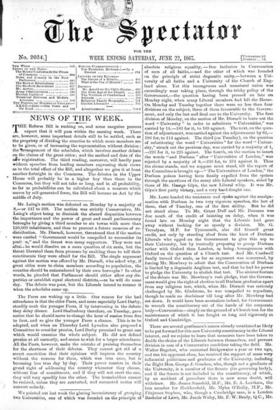We pointed out last week the glaring inconsistency of grouping
two Universities, one of which was founded on the principle of absolute religious equality, — free inclusion in Convocation of men of all faiths,—and the other of which was founded on the principle of strict dogmatic unity,—between a Uni- versity of all faiths and a University of the Church of Eng- land alone. Yet this incongruous and unnatural union was exceedingly near taking place, through the tricky policy of the Government,—the question having been pressed on late on Monday night, when many Liberal members had left the House. On Monday and Tuesday together there were no less than four divisions on the subject, three of them favourable to the Govern- ment, and only the last and final one to the University. The first division of Monday, on the motion of Mr. Disraeli to leave out the word "University " in order to substitute " Universities," was carried by 14,-183 for it, to 169 against. The next, on the ques- tion of adjournment, was carried against the adjournment by 82,- 196 for, to 114 against. The third (on Tuesday), on the question of substituting the word " Universities" for the word " Univer- sity," struck out the previous day, was carried by a majority of 1, —226 for it, to 225 against. The fourth, on the motion to insert the words " and Durham " after " Universities of London," was rejected by a majority of 8,-226 for, to 234 against it. Thus the clause stands, and we suppose must stand, till the report of the Committee is brought up—" The Universitias of London," the Durham poison having been finally expelled from the system through the exertions of the many able Liberal speakers, aided by those of Mr. George Glyn, the new Liberal whip. It was Mr. Glyn's first party victory, and a very hard-fought one.






























